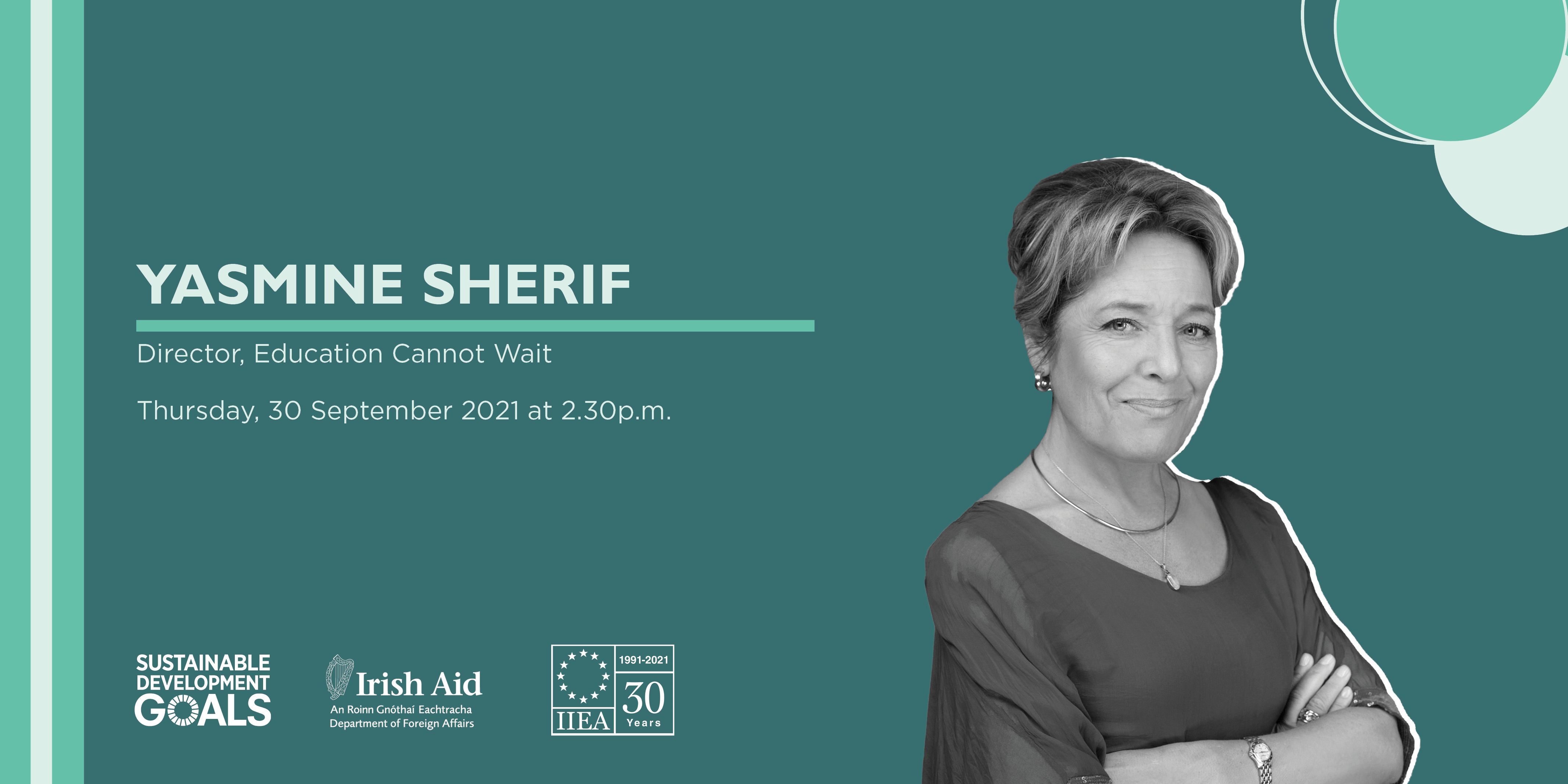Africa’s Forgotten Crisis: Global Education, COVID-19, and the Climate Emergency

Author: Stephen Frain
Introduction
The fifth lecture of the 2021 Development Matters series, which is supported by Irish Aid, was delivered by Ms Yasmine Sherif, the Director of “Education Cannot Wait”, a global fund established at the World Humanitarian Summit in 2016 in order to ensure the delivery of education in emergency situations. Ms Sherif discussed her recent opinion piece entitled: “Africa’s Forgotten Crisis” which addressed the impact of the climate emergency and the COVID-19 pandemic on global education. Ms Sherif highlighted the ways in which “Education Cannot Wait” is working to ensure that the education of young children, especially of young girls, can survive and thrive and reflected on how countries like Ireland can help in this endeavour.
In his introductory remarks to the lecture, Irish Aid Director-Director-General, Mr Ruairí de Búrca outlined that the issue of universal access to quality education is an important priority for Ireland. He also highlighted the importance of Ireland’s partnership with “Education Cannot Wait” to the work of Irish Aid on global education. He emphasised the significance of the humanitarian-development nexus and paid tribute to the important work that the NGO does to ensure the delivery of education during humanitarian crises. In November 2019, Irish Aid pledged €6 million over three years to “Education Cannot Wait”. It later announced that Ireland would add a further €2 million to its assistance in order to help mitigate the impacts of COVID-19 on global education.
The Impact of the Climate Emergency on Global Education
Ms Sherif began her address by reminding the audience that the climate emergency has and continues to have a significant impact on many children’s education. She noted how climate-induced disasters have been a major cause of displacement in recent years. Many of the most devastating consequences of global heating and climate change occurs in Africa. In many countries on the continent, educational infrastructure has suffered as a result of climate breakdown. Ms Sherif highlighted, that once children and adolescents are removed from educational settings, many of these young people are at risk of never returning to school again, Ms Sherif also highlighted how the natural disasters which followed Haiti’s recent earthquake has left many young children without access to school.
The Impact of COVID-19 on Global Education
Ms Sherif said that the impact of the COVID-19 pandemic on education has been felt all around the world, but not every country has been able to respond equally to the challenges the pandemic has posed. She cited UNICEF statistics which estimate that 1.5 billion children and youth have experienced prolonged interruption to their education caused by school closures during the pandemic. Moreover, UNICEF has found that 31% of students lack access to remote and distance learning opportunities. She remarked that the students without such access are most likely to be those from the poorest and most marginalised communities. She concluded that the impact of education loss on these children will last far longer than the impact of the pandemic itself.
What role for “Education Cannot Wait” and for Ireland?
Ms Sherif stated that in order to save this ‘forgotten generation’ out of education, the multilateral system must be protected, and needs to be steered back in the direction of a human rights-based focus. Furthermore, she argued that there needs to be a greater awareness of the importance of the development-humanitarian nexus for education. She commended Ireland on its recent election to the UN Security Council and encouraged it to continue its advocacy work for the delivery of education in humanitarian contexts. According to Ms Sherif, multilateralism is not just about states working together on education, it must also include working with the private sector. Ms Sherif posited that the “enormous financial resources” at the disposal of the private sector give it the potential to be a transformative humanitarian actor.
The Dire Implications of the Forgotten Crisis
Ms Sherif stressed the urgency of preventing the consequences of “a forgotten generation”. She cited the heightened risk of sexual exploitation and violence that young girls face when they do not have access to basic education, as well as the rise in the number of young boys without education joining militant and terror groups such as Boko Haram. She stated that terrorist groups such as Boko Haram are fundamentally opposed to girls’ education, so that when they grow up, they will join what Ms Sherif described as “a vicious cycle of victims and victimisation”. Again, this is not isolated to the African context, Ms Sherif argued. She also drew attention to similar situations in other parts of the world, such as Afghanistan where young boys without education are being recruited into the Taliban, and the Taliban are preventing more and more young girls from accessing education.
Conclusion: The Fierce Urgency of Now
Ms Sherif concluded by thanking the donors to “Education Cannot Wait”, who answered its call for funding at the start of the COVID-19 pandemic. Within twenty-one days of the call for funding, “Education Cannot Wait” had mobilized $23 million and then an additional $22.4 million a couple of months later. The funding was then distributed to 85 grantees in 32 crisis-affected countries, and the majority of it was dispersed in record time.
She highlighted how the effects of the pandemic on young children who do not have access to education continue to plague the lives of communities across Africa on a daily basis. According to a recent IPCCC report, published in August 2021 described how the devastating effects of the climate emergency will continue to ravage the world, in particular, developing countries where the capacity to deliver education in difficult humanitarian contexts remains weakest. Drawing on the words of Martin Luther King Jr, Yasmine Sherif urged the international community not to drop the mantle: “It's now. It's not tomorrow. It's not next year. It's right now. So that's how we operate”, she concluded.
